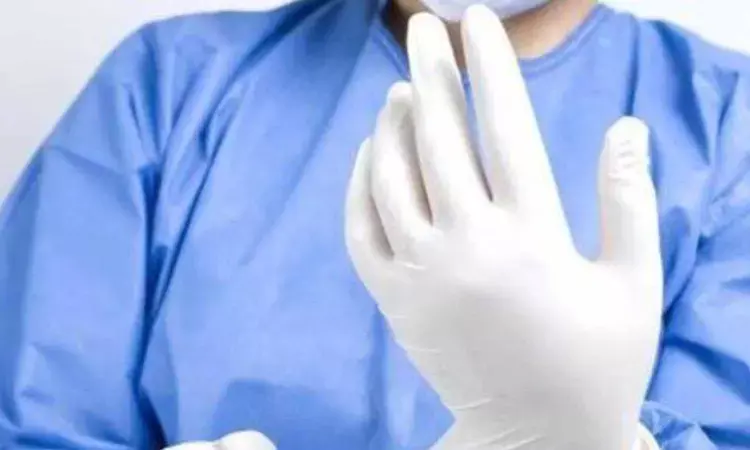- Home
- Medical news & Guidelines
- Anesthesiology
- Cardiology and CTVS
- Critical Care
- Dentistry
- Dermatology
- Diabetes and Endocrinology
- ENT
- Gastroenterology
- Medicine
- Nephrology
- Neurology
- Obstretics-Gynaecology
- Oncology
- Ophthalmology
- Orthopaedics
- Pediatrics-Neonatology
- Psychiatry
- Pulmonology
- Radiology
- Surgery
- Urology
- Laboratory Medicine
- Diet
- Nursing
- Paramedical
- Physiotherapy
- Health news
- Fact Check
- Bone Health Fact Check
- Brain Health Fact Check
- Cancer Related Fact Check
- Child Care Fact Check
- Dental and oral health fact check
- Diabetes and metabolic health fact check
- Diet and Nutrition Fact Check
- Eye and ENT Care Fact Check
- Fitness fact check
- Gut health fact check
- Heart health fact check
- Kidney health fact check
- Medical education fact check
- Men's health fact check
- Respiratory fact check
- Skin and hair care fact check
- Vaccine and Immunization fact check
- Women's health fact check
- AYUSH
- State News
- Andaman and Nicobar Islands
- Andhra Pradesh
- Arunachal Pradesh
- Assam
- Bihar
- Chandigarh
- Chattisgarh
- Dadra and Nagar Haveli
- Daman and Diu
- Delhi
- Goa
- Gujarat
- Haryana
- Himachal Pradesh
- Jammu & Kashmir
- Jharkhand
- Karnataka
- Kerala
- Ladakh
- Lakshadweep
- Madhya Pradesh
- Maharashtra
- Manipur
- Meghalaya
- Mizoram
- Nagaland
- Odisha
- Puducherry
- Punjab
- Rajasthan
- Sikkim
- Tamil Nadu
- Telangana
- Tripura
- Uttar Pradesh
- Uttrakhand
- West Bengal
- Medical Education
- Industry
Contact Allergy to Rubber Accelerators Steady Over 30 Years in eczema cases

A new study by Christoffer Kursawe Larsen and team found that contact allergy to rubber accelerators was linked to various forms of dermatitis, including hand dermatitis and leg/foot dermatitis. The findings of this study were published in Contact Dermatitis.
In order to vulcanize rubber products, such as rubber gloves, rubber accelerators are applied. The well-known allergens that cause contact allergies include certain rubber accelerators. The rubber accelerators and mixes thiuram mix, mercaptobenzothiazole (MBT), and mercapto mix are part of the European baseline series (EBS). This study's goals were to determine the incidence of contact allergies to rubber accelerators across a 30-year period, from 1990 to 2019, and to pinpoint pertinent historical patterns, high-risk professions, and exposures.
Data from all individuals with contact dermatitis who underwent concomitant patch testing with rubber accelerators at the Skin and Allergy Gentofte Hospital from 1990 to 2019 were evaluated. From 2005 to 2019, patients who were suspected of having a rubber accelerator contact allergy had further patch testing with rubber accelerators from the specialist rubber series, and these samples were taken again.
The key findings of this study were:
The prevalence of contact allergies to one or more rubber accelerators from the EBS series was 2.7% overall, showing a considerable drop in the first 12 years before stabilising during the last 18 years.
Leg/foot dermatitis, hand dermatitis, and occupational contact dermatitis all had associations.
Gloves were the most frequently exposed, while wet-work vocations were most frequently impacted.
The persistence of contact allergy to rubber accelerators over three decades raises concerns about the long-term health effects and calls for preventative measures. With gloves being a frequent source of exposure, efforts to reduce contact with these chemicals in high-risk occupations are crucial.
Reference:
Kursawe Larsen, C., Schwensen, J. F. B., Zachariae, C., & Johansen, J. D. (2023). Contact allergy to rubber accelerators in consecutively patch tested Danish eczema patients: A retrospective observational study from 1990 to 2019. In Contact Dermatitis. Wiley. https://doi.org/10.1111/cod.14421
Neuroscience Masters graduate
Jacinthlyn Sylvia, a Neuroscience Master's graduate from Chennai has worked extensively in deciphering the neurobiology of cognition and motor control in aging. She also has spread-out exposure to Neurosurgery from her Bachelor’s. She is currently involved in active Neuro-Oncology research. She is an upcoming neuroscientist with a fiery passion for writing. Her news cover at Medical Dialogues feature recent discoveries and updates from the healthcare and biomedical research fields. She can be reached at editorial@medicaldialogues.in
Dr Kamal Kant Kohli-MBBS, DTCD- a chest specialist with more than 30 years of practice and a flair for writing clinical articles, Dr Kamal Kant Kohli joined Medical Dialogues as a Chief Editor of Medical News. Besides writing articles, as an editor, he proofreads and verifies all the medical content published on Medical Dialogues including those coming from journals, studies,medical conferences,guidelines etc. Email: drkohli@medicaldialogues.in. Contact no. 011-43720751


